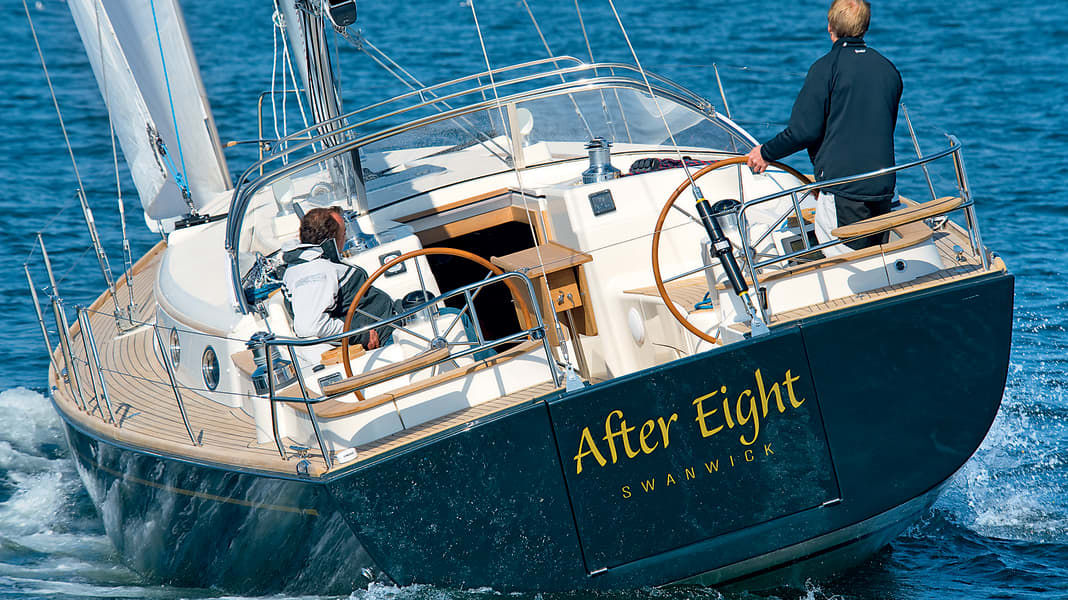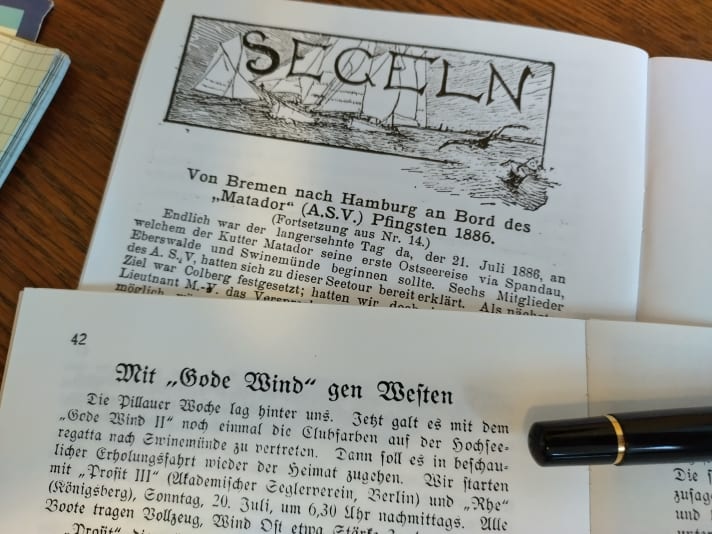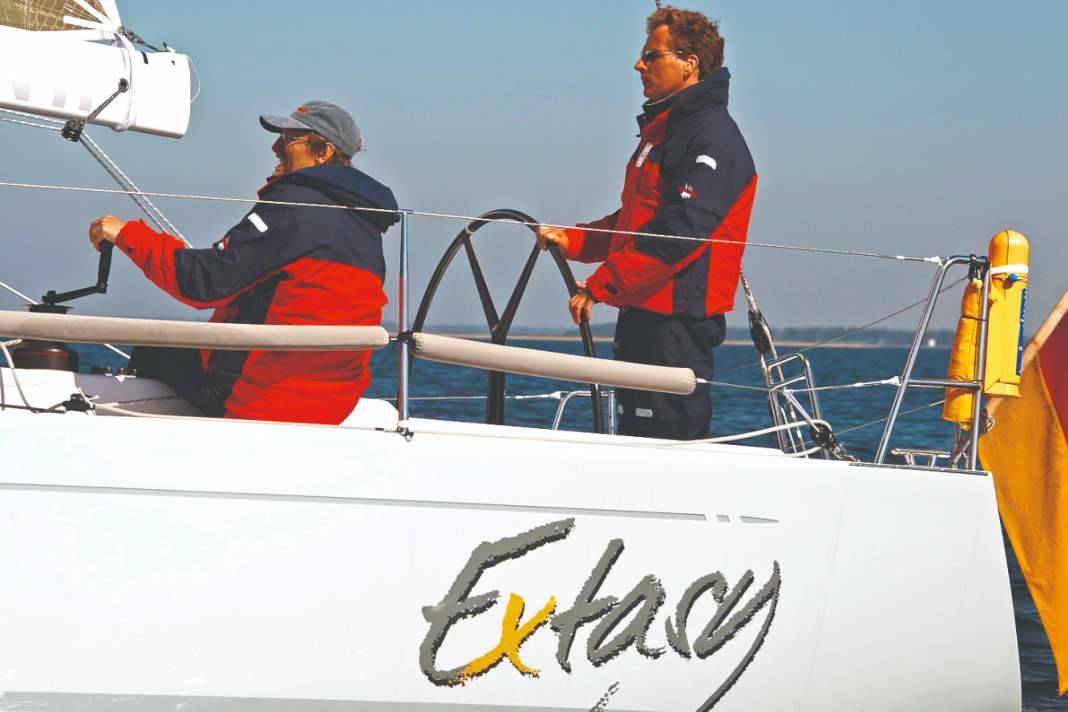
The trigger to take up the topic here and now was an email from YACHT reader Peter B.. While reading the current issue, he wondered why the article "Stormy pleasure" (YACHT 7/2023) always referred to "the" and not "the".Peter von Seestermühe is being talked about. Boats are female and should therefore be addressed in the female form, even if their name is masculine.
To make a long story short: There is no right or wrong in this question. In fact, it is now widespread to always refer to boats in the feminine form. But there are exceptions. As with "the"Peter von Seestermühe.
There are also no traditional yachting customs to refer to. On the contrary, it used to be much more common and natural to speak and write about boats in the masculine form when they had a male name. The fact that it has become customary over the past decades to use the female form of address is probably due to the fact that the majority of boats were given female names.
Female or male form of address? Or both?
So both are permitted, the female form of address for ships with female (or gender-neutral) names. And either the female or male form of address for ships with male names. In the latter case, you are welcome to leave it up to the owner to decide how he wants it handled. For old ships, you should choose the form that has become customary. For example, "the" Alexander von Humboldt, but "the" Peter von Seestermühe.

The name itself is much more important than the form of address anyway. Why are boats called what they are called? This was the subject of a scientific study around ten years ago. YACHT author Holger Petersen reported on it at the time:
"Our study shows very clearly that the assignment of a boat name differs from the assignment of other names in that there is almost always a story behind it, often in a coded way." This is how Dr Jan-Claas Freienstein, 43, from the Chair of German Linguistics at the University of Augsburg put it. 463 boat owners responded to an appeal in YACHT and provided the linguist with information.
In all candour, they explained how they came up with the respective names for Jolle or Yacht: "My girlfriend calls me 'Bear'", "I lost a bet", "I just stopped working in drugs", "I became a Dickerle".
Boat names: sometimes more, sometimes less curious






Before he delves into such subtleties, however, Freienstein first analyses the fundamentals: "From a naming perspective, it is remarkable that vehicles are given a name at all." According to the researcher, the "purpose of unambiguous identification" of a boat "could also be achieved using a number or letter system, as is known from inland shipping or cars. However, this is obviously not enough for ship and boat owners, as inland waterway vessels also have a 'real' name in addition to their number identification."
A boat name has a special function: it turns a series-produced yacht into a unique item - true to the linguistic difference between generic names and name words. "Generic names are used to designate an entire class of similar objects. For example, the word Bavaria can be used to refer to all Bavarias," explains Freienstein. "The situation is different with names: They serve to name a specific object, a specific person, a specific place in an individualising way."
The purpose of a boat name is therefore to make a boat stand out from the crowd.
Since time immemorial, floating vehicles have been given names even though, strictly speaking, they don't need them. In addition to individualisation, this has a lot to do with traditional superstition. And so the following still applies: "Naming should obviously achieve something that goes beyond the exact recognition of a vehicle: a boat name is more than just a licence plate."
And according to Freienstein, this means above all: "He is not elected by chance." However, the background and motives behind such choices are usually not immediately obvious. "Sometimes you have to think around many corners before you realise it," says Freienstein. "Grautvornix" or "Verleihnix" can indicate an Asterix fan, but it doesn't have to. "The name 'Verleihnix' could also suggest a thrifty craftsman, 'Grautvornix' a particularly storm-proof boat or an intrepid crew," says Freienstein. "Ultimately, however, you only know that when you ask the people who gave the name. And that's exactly what our study was designed to do."
The scientist's boat also has a name that requires explanation
Freienstein's own boat is called "Linje", which also requires an explanation: "As an East Holstein native working in Augsburg, far from the coast, I associate it with my home area with the Puttgarden-Rødby bird flight route. Others probably think of aquavit first."
No, it's not an easy topic. Some things seem obvious, but are difficult to understand even for linguists. "Shania", for example. "A melodic name," says Freienstein, "which I couldn't do anything with at first." He initially researched Shania Twain - perhaps the owner idolised the Canadian singer. However, things turned out to be much more complicated and the trail led Freienstein to the culture of the North American Ojibwa Indians and to Kurdistan.
"Indians integrated wishes in name syllables," he says. "Shania means translated: 'I am on my way'. At the same time, Sha-nia is Kurdish. Sha means king, nia means wish. The 'king's wish' is followed by the modification to 'great wish'. Either way, it goes wonderfully with boats and is increasingly popular. This example shows once again how associatively boat owners think when assigning names."
The most popular names for sailing yachts
This undoubtedly applies to the absolute favourite among German boat names, the yachting counterpart to Müller and Meier, even if it is derived from a much simpler association: "Albatros" leads the list of yachts registered with the German Sailing Association by a wide margin. And it is also the number one among the new boats registered there as of 2013.
This suggests a rather boring, still conservative and uncreative approach to this topic, which has its advantages from the expert's perspective. "Albatros" is a "classic boat name", and such classics are said to have a "relieving function": "They save the effort of finding an individual name."
From a naming expert's point of view, the same applies to "treasure" as a pet name for a partner: "The classics evoke associations that are linked to the object of the name: Just as 'treasure' prototypically stands for what is worth a lot to you, 'albatross' prototypically stands for a creature that seeks the sea and avoids staying on land whenever possible." The flipside:
The aim of naming is uniqueness. Names that are widely used stand in contrast to this.
Nevertheless, the list of favourites reads in part like an oldies hit parade: "Antares", "Delphin", "Calypso", "Odin", "Shanty" and so on. Obviously, they don't like to experiment.
The majority of the most common names do not need a deeper explanation. This applies equally to "desired, ideal, visual or tactile" boat characteristics in the name ("Speedy") and to the common female names.
There is a completely different phenomenon that Freienstein discovered in his study: There are people who name their boat rather crudely for a reason that may not be obvious to them - so that people talk about them and with them. A cryptic boat name quickly becomes a talking point. For example, "Puttfarken".
It comes from the Frisian: Putt means small, cute, and Farken means piglet. Helga and Bodo Janßen from Norddeich gave their Vilm this name and caused a lot of discussion. They are constantly asked about the lettering on the bow, which many people find incomprehensible, and still recognise it years later. "Countless contacts have been made this way," they say. "On Wangerooge, a woman from the boat opposite came up to us. She had hardly slept for two days, she said. She had been wondering the whole time what 'Puttfarken' meant."
If the number of new acquaintances to be expected is anything to go by, the owner of the catamaran "Schmalblättriger Breitwegerich" will hardly be short of company.
Why a boat is called a lugworm
The name "Lanice" presents the viewer with other puzzles - only seemingly simply explained with something along the lines of a woman's name. The owner of the Hanse 331 is a pharmacist. He derived the beauty of his boat from observing, mind you, a lugworm. For the Augsburg study, he described how it came about: "Years ago, I dug up Lanice in the mudflats. In contrast to the literature, which only ever depicts the worm's sandy tube, I was shown the supple white body, which was searching for grains of sand with its coloured tentacles to build its tube. I marvelled at this sight for hours ... When I stood in front of my boat for the first time - the slender white body, the many coloured lines - it was clear to me: this is the 'Lanice'."
Female names were used more frequently in the past
Freienstein's study shows a downward trend in the popularity of women's names. "Perhaps the wife's first name was used more in the past," says the scientist, "to document Skipper's bond with his wife - or to strengthen her emotional attachment to the ship. Of the 463 names analysed, only five can still be derived in this way."
The researcher attributes the decline to the fact that "sailing is evolving away from being a 'men's sport'". Because women have long been winning regatta silver medals and shedding outdated role clichés in cruising sailing, "this naturally also changes the boat names". Of course, this does not generally affect the still popular representation of family ties. These days, however, "Lenchen" - as in the case of the LM 27 from Bremerhaven - is rarely the wife, but rather a child or grandchild.
Acronyms from the names of loved ones are also still in vogue, such as on the Jeanneau "Perola", made up of the first letters of Peter, Rosemarie, Lars and Astrid.
In general: the family. The family provides the inspiration for boat naming across borders. "It's an international phenomenon that already existed in Viking times," says Freienstein. The British "Fereale" is a current example of this. The skipper has Frisian ancestors and chose a name that means "old love" in Frisian. So there is hardly a family aspect that could not be used to construct a boat name, even if it is the increased occurrence of "freckles" in the offspring.
The family band is often reflected in the boat's name
This kind of irony at least usually creates a unique position. "Pigs in Space" also falls into this category. "This is originally the title of an episode from the 'Muppet Show' in which an extremely incompetent crew has adventures in space," says Freienstein. In general, "pop culture is a cornucopia of humorous elements" for finding boat names.
Other very interesting trends can be seen from the Augsburg study. "Traudel IV", for example, is completely outdated; only 7.5 per cent of the boat names examined still have numerical suffixes. Freienstein has identified a clear correlation with boat size: "I notice that proportionally fewer numbers are used for boat lengths of up to ten metres, while the pendulum swings in the other direction for boat lengths of ten metres or more."
The reasoning makes sense: The large yacht is usually preceded by several smaller ones, and the name transfer is intended to "transfer positive associations of the first years to the larger successor".
25 per cent of used boat buyers respect the previous name and hold on to it
What's exciting in this context, says Freienstein: "Without numerical attachments, the chance of a name takeover increases after a change of ownership! 25 per cent of new owners respect the previous name." However, if a "Traudel IV" is acquired, it will "definitely" be renamed at the next opportunity: "As a new owner, who would want to sail under a name like that?"
One of the most astonishing results of the study is the prevalence of "qualitatively" different names, i.e. the issuing of boat names from the loosely disreputable corner (the researcher: "borderline names", for example "Bigami" or "Leek Cream Soup") and those with a serious background. "Clearly," says Freienstein, there is a recognisable connection. "Only 2.6 per cent of boats up to ten metres have 'casual names'. The rate rises to 5.6 per cent in the class up to twelve metres. Contrary to all expectations, owners of luxury yachts over twelve metres in length seem to be even more relaxed about it. The rate of names worthy of discussion there is 7.8 per cent."
It follows that, contrary to popular belief, the tendency to use humorous, derogatory or slippery names correlates with the size of the yacht, and therefore generally also with the size of the investment.
It's all a matter of taste, and at the end of his study, even researcher Freienstein doesn't have a patent remedy for the right individual yacht name up his sleeve. But there is one tip: when juggling words, there is one criterion that should never be ignored. The owner of a "Weil ich will und aus" or a "Simsalabimbambasaladusaladim" will be annoyed in foreign harbour offices and in an emergency on the radio that he has not simply christened his yacht "Albatros". Sometimes simplicity clearly has its advantages.
10 boat names that are best avoided:
- 1. "Hoka hey"
Crazy Horse once shouted this on his way into battle. Translated: "Today is a good day to die." Who wants to sail along? - 2. "One Way Ticket"
The home harbour no longer seems to appeal. - 3. "Captain Morgan"
I wonder if too much alcohol was consumed on the ship before it sank in 1984? - 4. "DeSa'Ilma"
The first letters of all the family members are often thrown together to form an artificial word. Outsiders can often only guess what it's all about. - 5. "Little fast leopard"
It's a good thing that Opti children don't have to worry about how well and quickly the boat's name can be spelt on the radio. - 6 "Banana Wind"
Fruit that flies around your ears on board? - 7 "Bachelors Delight"
A bachelor obviously wants to attract ladies who are ready to get married. Watch out, dear sailors! - 8. "Harbour rat"
Hm, who else would like to go alongside? - 9. "Rhein Neckker"
Humour is when you laugh anyway! - 10. "Valhalla"
The yacht as a refuge for sailing legends who have fallen in the battle of the regattas?
Call: If you come up with any boat names worth thinking about or discussing, please send us a photo of them to mail@yacht.de

